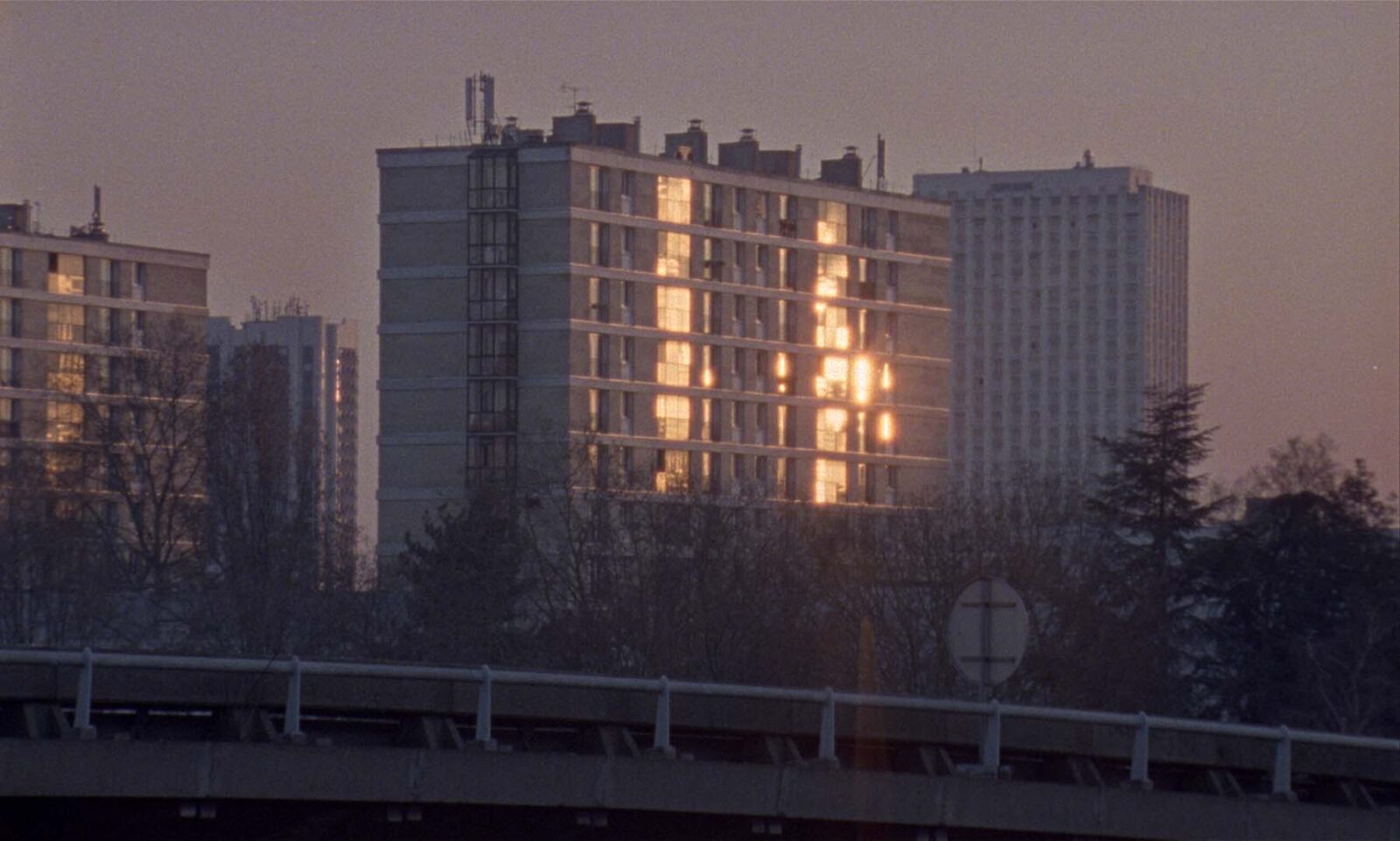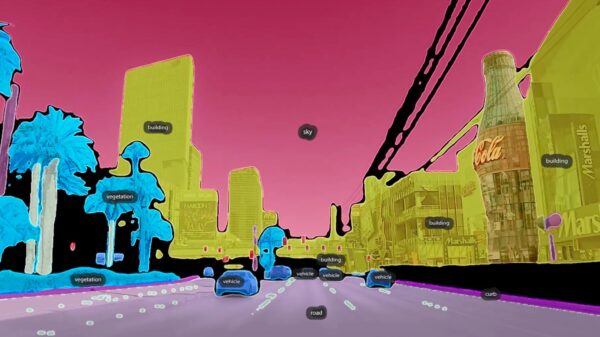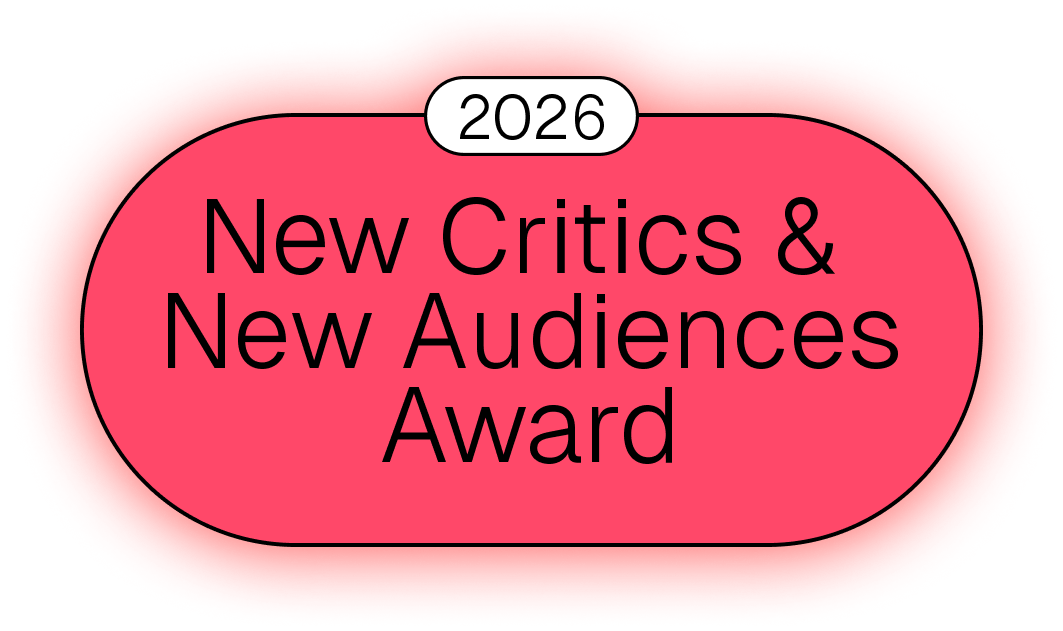When Light Touches Skin
Exalted Mars
Jean-Sébastien Chauvin’s city symphony generates affect before analytics, allowing it to continuously play with expectations and observations as it progresses.

During the 1920s, a sub-genre defined as “city symphony films” emerged: Avant-garde films without dialogue, characters, or a traditional narrative, depicting the pace and intensity of the modern city by observing the architecture and flow of urban life. The first opening shots of Exalted Mars bring to mind those films, as an endless stream of traffic and red car lights is seen on a highway just before the first light—a metropole awakens. Then, an unexpected element is presented: a naked man in a dark room, immersed in deep sleep. His body perspires as he breathes heavily. The questions characteristic of the opening sequence immediately come to mind: Who is this man, and how is he connected to the city’s imagery? Is he dreaming about the heavy traffic? Or perhaps he is somehow conjuring this urban activity?
Strange as it sounds, answers to these questions will not necessarily be given in Exalted Mars, winner of the Teddy Award for Best Short Film at Berlinale Shorts and the fifth short by French filmmaker and critic Jean-Sébastien Chauvin, who presented the film in international competition at Short Waves Festival last week. The film seems primarily interested in exploring unusual cinematic connections through unconventional editing. It indulges us in a meditative and mysterious journey of a man and a city in the wee small hours, aiming to embody a moment of a carnal shift, a transition in one’s state of being.
Juxtaposing the city’s activity with external elements to form a figurative or symbolic meaning, as Chauvin does with the sleeping man and the waking town, is a common trait for city symphony films. But atypical to the genre, here, the city is not given specificity or distinct characters that can glorify its energetic demeanour. The components are present—buildings, roads, people (and one particularly present light pole)—but they are almost intentionally generic and lack allure. In fact, there isn’t much indication of where the film takes place. Based on the architecture, cars, and some road signs, we can only assume it is a Western European city (the ending credits imply those are the suburbs of Paris).
This is not to say that the cinematography isn’t beautiful. What makes the shots distinct is the time they were taken; the delicate transition between night and dawn is illustrated through a looming soft light, particularly meticulous with the use of 16mm film. Similarly, we may gather limited impressions about the sleeping man through his well-formed figure and tattoos, but we need more to learn about him. Light, or the lack of it, also plays a vital role in those scenes. Most of the room is dark, and only some portions of the body are intermittently exposed with a soft, warm hue as the man turns in his sleep.
In that sense, the city and the man function more as symbolic representations than characters. Their connection is reinforced through what seems like a shared time and ambiance. Yet, there is also an intriguing tension between the city’s constant traffic movement and the man’s sleepy stillness, especially prevalent in the film’s first part. Weaving the man’s attempts to sleep—as he sweats and moves frequently from one side to another—with the ceaseless flow of cars seems to bring an inescapable bustling tension. Is this a reflection of his racing mind? The sense of unease produces anticipation and intensity. Then, intimate close-up shots of the man’s genitals begin to appear. At first, they are baffling, but gradually, their instrumentality sinks in. Male nudity, particularly explicit penis shots, became increasingly common over the past year in mainstream TV in acclaimed shows such as Euphoria and White Lotus. Yet, Exalted Mars vividly reminds us again how rare and surprising it still is to encounter such male body imagery, specifically in short films.
The fact that the man is paralysed in his sleep, unaware of our close gaze, makes us wonder—are we suddenly turning into voyeurs? Not necessarily. While the film portrays very private and intimate moments, Chauvin’s view remains respectful and not intrusive. Cinematographer Maxime Berger’s lens handles the naked male body with care and caution—sensual but not objectifying. It’s difficult to pin down how exactly this notion is formed, but Chauvin makes us trust his intentions that these shots aim to serve a more poetic experience rather than being bluntly pornographic. Robert Bresson famously said: “I’d rather people feel a film before understanding it. I’d rather feelings arise before intellect.” In a sense, this is what Exalted Mars prompts us to do. It’s a viewing experience that generates an affect within us before an analytical process occurs, allowing the film to play with expectations and observations as it progresses continuously. The definition of affect by philosophers Deleuze and Guattari seems particularly pertinent in describing said process: “a prepersonal intensity corresponding to the passage from one experiential state of the body to another.” 11 Deleuze, Gilles; Guattari, Félix (1987) [1980]. A Thousand Plateaus: Capitalism and Schizophrenia. Capitalism and Schizophrenia. Vol. 2. Trans. and foreword by Brian Massumi. Minneapolis and London: University of Minnesota Press. p. xvi. ISBN 978-0-8166-1401-1. OCLC 16472336. ↩︎
Towards the end, the anticipated shift occurs. The editing pace slows, and the music changes into positive and brighter tones. Something seems to have been resolved; the night’s heat has faded, and the sun is finally rising. Was it all just a dream? The use of film is now at its most stark presence when the sunlight shines through. Instead of heavy traffic, we focus on shimmering light reflecting on windows and water, capturing the movement of light through time and space. Isn’t that what film is all about?
Exalted Mars uses few visual elements and clever editing to remind us of the potency of thought-provoking minimalistic cinema. Despite that, Chauvin may only satisfy some viewers. The film’s many loose ends and the peculiar conjunctions of eroticism and urban life may be challenging for some. Yet, they are precisely what makes Exalted Mars such an intriguing cinematic experience, inviting those who surrender to it to think about it long after it ends. Even more so, the film beckons us to look within ourselves and listen carefully to our inner affects and experiential transitions as we may find a small moment of catharsis.






There are no comments yet, be the first!